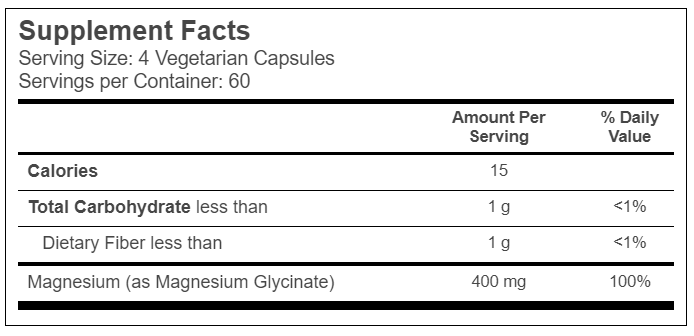Menu
Sale!



Supplements
Magnesium Glycinate 350mg. / 240ct.
$39.99 Original price was: $39.99.$34.00Current price is: $34.00.
Magnesium glycinate is formed from elemental magnesium and the amino acid glycine.
Your body employs this amino acid in protein construction. It also occurs in many protein-rich foods, such as fish, meat, dairy, and legumes.
Glycine is often used as a standalone dietary supplement to improve sleep and treat a variety of inflammatory conditions, including heart disease and diabetes (23Trusted Source).
Magnesium glycinate is easily absorbed and may have calming properties. It may help reduce anxiety, depression, stress, and insomnia.
Magnesium is the fourth most abundant mineral in your body.
It’s involved in over 300 metabolic reactions that are essential for human health, including energy production, blood pressure regulation, nerve signal transmission, and muscle contraction (1Trusted Source).
Interestingly, low levels are linked to a variety of illnesses, such as type 2 diabetes, heart disease, mood disorders, and migraines (2Trusted Source).
Out of stock
Category: Supplements
Magnesium Glycinate 400mg. / 240ct.

Magnesium Deficiency
According to the NIH, most people in the United States do not get enough magnesium from their daily diet. Men older than 70 years of age and girls under 18 years of age are most likely to have low intakes of magnesium.
Low magnesium intake does not typically cause any symptoms. The body loses a certain amount of magnesium every day as a result of normal processes, such as muscle movement, the heartbeat, and hormone production.
Though only a person needs only a small amount of magnesium, it is important to replenish magnesium levels to prevent deficiency.
When people who do not have magnesium deficiency experience low magnesium levels, the kidneys help to retain magnesium by restricting the amount that the body loses in the urine. This process has a temporary effect until levels rise, but a person with low magnesium levels for long periods can develop magnesium deficiency.
Causes of Magnesium Deficiency
There are non-dietary causes that can reduce magnesium levels.
Some medical conditions and medications affect magnesium absorption. They can also increase the amount of magnesium expelled from the body. These factors can result in magnesium deficiency.
Health conditions that can lead to magnesium deficiencies include:
- gastrointestinal diseases, such as irritable bowel syndrome, Crohn’s disease, celiac disease, and ulcerative colitis
- diabetes
- pancreatitis
- high thyroid hormone levels
- kidney disease
- long-term use of proton pump inhibitors, such as Prilosec
Some medications can have a similar effect, including:
- taking prescription drugs used to treat acid reflux or peptic ulcers, which can lead to low blood levels of magnesium when people take them over a long period
- taking diuretics, which assist with water retention and can increase or decrease the loss of magnesium through urine.
Certain lifestyle factors can also reduce magnesium levels, including:
- drinking too much coffee, soda, or alcohol
- eating too much sodium
- heavy menstrual periods
- excessive sweating

Because magnesium is so important for proper nerve transmission, it comes as no surprise that it also plays a vital role in muscle contraction. When magnesium is depleted, muscle contractions can become weak and uncoordinated, leading to involuntary spasms and painful cramps.
This is actually one of the most common early signs of magnesium deficiency. Spasms typically occur in the legs, feet, and sometimes even in places like the eyelids. If you are a woman, you may also experience worsened PMS-related cramping when magnesium stores are low.
Chronic pain and related conditions like fibromyalgia are heavily related to tension carried in the body. This tension can be purely physical, but can also be aggravated by emotional stress as well. Emotions such as anxiety, anger, and worry all contribute to physical tension. Over time this chronic tension leads to pain.
When magnesium stores are low in the body, the nervous system can become hyper excitable (meaning easily overstimulated) which can increase muscle tension. Magnesium can play a role here by helping to elicit an overall calming effect on the mind and body while soothing and relaxing the muscles.
The heart is a muscle that constantly contracts inside our bodies without needing to be consciously controlled. Just as with other muscles in the body, the heart relies heavily on magnesium for proper contractility. This is thought to be due to its role in regulating calcium and potassium concentrations in the muscle tissue (5).
If you notice that your heart beats irregularly, magnesium may be something to address. This includes rapid heartbeats, slow heartbeats, and sudden changes in heart rhythm for no apparent reason.

Magnesium plays a crucial role in regulating neurotransmitter balance. Neurotransmitters are chemicals in the brain that regulate thought patterns and behaviors ranging from motivation to sleep to focus (and many more). As mentioned before, magnesium is particularly involved in GABA production in the brain, which is a calming neurotransmitter.
A poor ability to produce adequate GABA in the brain results in conditions such as ADD/ADHD, anxiety, irritability, and general mood imbalances. If you identify with these feelings on a regular basis, you should consider increasing your daily magnesium intake.
Magnesium is well known for its diverse actions within the human body. From a neurological standpoint, magnesium plays an essential role in nerve transmission and neuromuscular conduction. It also functions in a protective role against excessive excitation that can lead to neuronal cell death (excitotoxicity), and has been implicated in multiple neurological disorders. Due to these important functions within the nervous system, magnesium is a mineral of intense interest for the potential prevention and treatment of neurological disorders. Current literature is reviewed for migraine, chronic pain, epilepsy, Alzheimer’s, Parkinson’s, and stroke, as well as the commonly comorbid conditions of anxiety and depression. Previous reviews and meta-analyses are used to set the scene for magnesium research across neurological conditions, while current research is reviewed in greater detail to update the literature and demonstrate the progress (or lack thereof) in the field. There is strong data to suggest a role for magnesium in migraine and depression, and emerging data to suggest a protective effect of magnesium for chronic pain, anxiety, and stroke.
Be the first to review “Magnesium Glycinate 350mg. / 240ct.” Cancel reply
Related products
-
Supplements
Sleep – GABA Gamma – Aminobutyric Acid Description
Rated 0 out of 5$22.95Original price was: $22.95.$12.65Current price is: $12.65. Add to cart -
Supplements
Life Extension N-Acetyl-L-Cysteine — 600 mg
Rated 0 out of 5$27.95Original price was: $27.95.$12.50Current price is: $12.50. Read more -
Supplements
ZeoChargeHeavy Metal Detox Binder ( 8 Pack )
Rated 0 out of 5$552.00Original price was: $552.00.$420.00Current price is: $420.00. Add to cart









Reviews
There are no reviews yet.